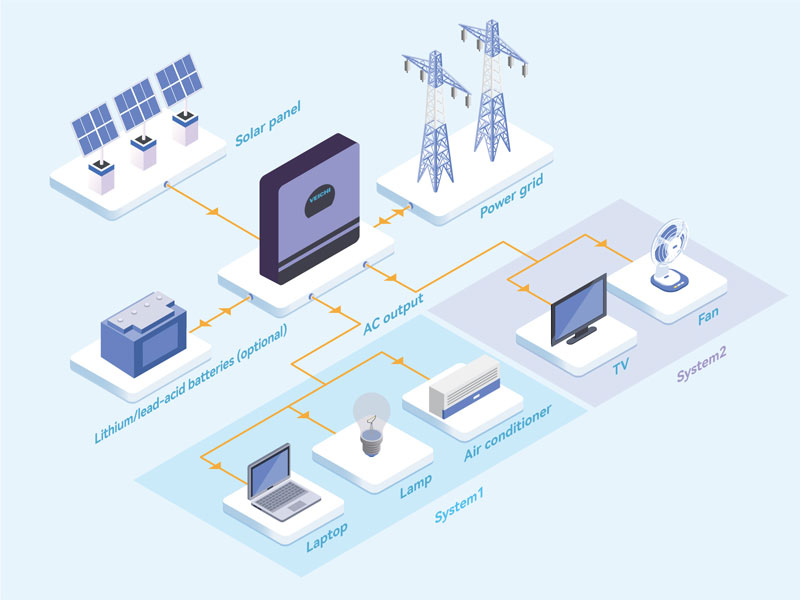SISV Series 6.2kW & VHS Series 5kW Hybrid Solar Inverter | 30% Deposit
Our BLDC Solar Pump System uses solar panels to capture sunlight and convert it into electrical energy. The controller then regulates this energy for optimal performance . The system ensures efficient water distribution to supply crops and livestock with the necessary hydration.
Widely used in agricultural irrigation, water supply, animal husbandry, etc. Aiming to make it simple for farmers, VEICHI provides system package solution including inverter, solar pump and necessary accessories and supports two-year warranty.
SISV Series 4.2kW/6.2kW/8.2kW/10.2kW Hybrid Solar Inverter Overview
SISV Series 4.2kW/6.2kW/8.2kW/10.2kW hybrid solar inverter is suitable for the household photovoltaic energy storage system. DC power generated by solar panels is stored in the battery through the inverter. When electricity is needed, it is first supplied by solar panels. If the light intensity cannot support the operation of solar panels, the inverter will convert the DC power of the battery into a single-phase power for home load. If the battery power is not enough, it can be quickly switched to power grid to supply power.
SISV Series 4.2kW/6.2kW/8.2kW/10.2kW hybrid solar inverter has a colored LCD and a variety of communication functions. It can be remotely operated through the mobile phone APP, which is convenient and fast. It can output pure sine wave, run stable and reliable. Replaceable fan design enables customers to maintain safety and convenience.
Hybrid Solar Inverter Topology

SISV Series 4.2kW/6.2kW/8.2kW/10.2kW Hybrid Solar Inverter Advantages
-
Energy Independence: One of the primary advantages of hybrid solar inverters is that they allow homeowners and businesses to reduce their dependence on the grid. By storing excess solar energy in batteries, users can have access to electricity even during power outages or at night when the sun is not shining.
Dual Output
This series hybrid solar inverter includes two built-in AC output ports, capable of simultaneously supplying power to two application systems. You can configure priority settings, adjust daily usage schedules, and enable automatic power disconnection and reconnection. -
Maximizing Self-Consumption: Hybrid inverters are designed to optimize self-consumption of solar energy. They prioritize using solar power generated on-site before drawing electricity from the grid, which can lead to significant energy cost savings.
-
Time-of-Use Optimization: Many regions have time-of-use (TOU) electricity pricing, where electricity costs more during peak hours. Hybrid inverters can be programmed to use stored energy during peak hours, further reducing electricity costs.
-
Grid Stabilization: Hybrid solar inverters can provide grid stabilization services, such as voltage and frequency regulation. This can be beneficial for areas with unstable or unreliable grid connections, helping to maintain a consistent power supply.
-
Backup Power: When integrated with a battery storage system, hybrid inverters can provide backup power during grid outages. This is particularly important for critical applications like healthcare facilities, data centers, and homes with medical devices that require continuous power.
-
Scalability: Hybrid solar inverters are often modular and can be easily expanded by adding more solar panels or batteries. This allows users to start with a smaller system and gradually scale up to meet their energy needs.
-
Efficient Energy Conversion: Hybrid inverters are designed for high efficiency, which means they can convert a higher percentage of solar energy into usable electricity. This efficiency is important for reducing energy losses and maximizing the return on investment.
-
Remote Monitoring and Control: Many hybrid inverters come with advanced monitoring and control capabilities that allow users to remotely monitor their solar power system's performance and adjust settings as needed through smartphone apps or web interfaces.
-
Environmental Benefits: By reducing reliance on fossil fuels and optimizing energy usage, hybrid solar inverters contribute to a reduction in greenhouse gas emissions and help combat climate change.
-
Financial Benefits: Over time, hybrid solar inverters can lead to significant cost savings on electricity bills, especially in regions with high electricity prices. They can also increase the resale value of homes and businesses equipped with solar and storage systems.

